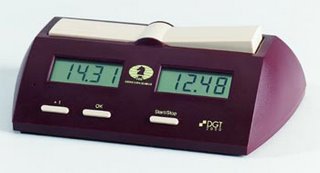Dana Mackenzie posted a lengthy piece on John Donaldson and the USCL's San Francisco Mechanics. It is quite a good read, though I was taken aback by the following paragraph:
So, when Mackenzie/Donaldson say that Bhat showed "good sportsmanship," what could they possibly mean? ...that Vinay considered the option of cheating, but chose not to because "he felt honor bound?" ...that the TD wasn't looking, so Vinay realized he could get away with playing another move, but didn't do so since he realized it would be wrong? Could they possibly mean to disparage Bhat's reputation in this way?
Isn't it more likely that Vinay played the inferior move on the computer because that's what the rules required and he never considered anything other than following them? That's what I'd like to believe. I'd also like to believe that playing by the rules is an expectation of all players in the league. Therefore, I don't think we need to be handing out good sportsmanship medals and badges of honor to those who do so.
In fact, Bhat’s loss was a triumph of good sportsmanship. As shown in my previous post, in league competition Bhat plays his moves on a regular board and with a regular clock, then enters them into the computer. (At least until the time pressure gets too intense, then he switches to all-computer mode.) Against Lugo, Bhat played 23. Bd5 and then realized it was a bad move. However, according to Donaldson, because he had already made the move on his board "he felt honor bound to make that move on the computer."I'm not sure what to make of this. The USCL rules clearly state that entering a different move into the computer than was made on the board is illegal:
A player may also play with a physical board at their side, as some players can concentrate better on an actual chessboard as opposed to playing directly at a computer. In this case the players would first make their move on the chessboard and then input it into the computer. The player is FORCED to make whatever move they made on the chessboard on the computer as well. If a TD sees that they have done otherwise then the player will be penalized.Were this rule not in place, players would be able to use their physical boards to analyze the position prior to selecting a move to play on the computer -- a clear violation of the principles of OTB play.
So, when Mackenzie/Donaldson say that Bhat showed "good sportsmanship," what could they possibly mean? ...that Vinay considered the option of cheating, but chose not to because "he felt honor bound?" ...that the TD wasn't looking, so Vinay realized he could get away with playing another move, but didn't do so since he realized it would be wrong? Could they possibly mean to disparage Bhat's reputation in this way?
Isn't it more likely that Vinay played the inferior move on the computer because that's what the rules required and he never considered anything other than following them? That's what I'd like to believe. I'd also like to believe that playing by the rules is an expectation of all players in the league. Therefore, I don't think we need to be handing out good sportsmanship medals and badges of honor to those who do so.

